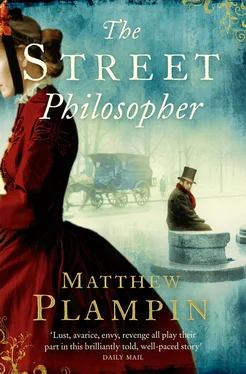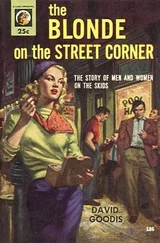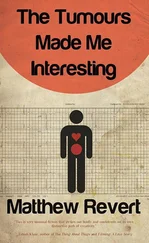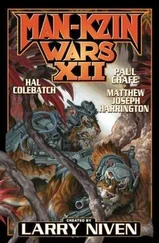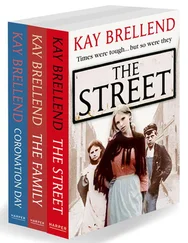Despite the heavy screen of smoke, the cannon-fire up ahead seemed to be growing ever more intense, as if the gunners were attempting to compensate for the fact that they were firing blind by firing twice as often. Units of British horse artillery had joined the fight, rolling up close behind the lines of infantry. Even at a mile and a half’s distance, the sound was quite overpowering. Madeleine wondered how anyone could stand it for more than a couple of minutes. And the landscape, so picturesque only two hours before, had been thoroughly despoiled by the passage of the army. Fences, hedges and trees had been blasted away, and soft green fields trampled to mud.
She cleared a low rise in the plain. Before her, at least sixty badly wounded infantrymen had been laid out along the sides of the road, flailing and thrashing in their agony. Bandsmen and a handful of civilian orderlies weaved amongst them, binding wounds as best they could with lengths of lint, and passing around canteens of water.
Too late, Madeleine tried to avert her eyes. The bay grew restless, unnerved by the smell of warm blood, lifting its hooves and shaking its head. Then a private, bleeding heavily from the midriff, began to screech in agony as she passed, a horribly high-pitched sound, his legs pedalling against the mud as if he were working a treadmill. The horse started, tossing its mane; then it stepped around the wounded man, leaving the post road and heading towards open ground. Madeleine pulled at the reins as hard as she could, but the animal ignored her completely.
She considered calling to the orderlies for assistance, but something made her hesitate; and before she could change her mind, the bay had quickened its pace to a canter, and she was forced to devote all of her energy to remaining in the saddle. Madeleine flung her arms around the horse’s thick neck, and the bay and its helpless rider charged off into the battlefield.
Squinting, Kitson looked out from what remained of the copse. Close by were the soldiers of the 99th, gripping their rifles tightly. They had been lying down under fire now for over an hour. Every one of them was drenched with sweat, and flecked with dirt and blood. Their eyes, milky white in their grimy skin, were staring ahead, alert for incoming fire. The riverside village had all but burned to the ground, and the curtain of smoke was gradually being drawn away by the breeze, revealing their foe. The Russian fortifications, studied close up, seemed virtually impregnable; steep, dark walls of earth behind which bristled a multitude of musket barrels.
A mounted messenger was galloping along the line. He pulled up next to two senior officers; Kitson recognised Sir George Brown, the General in command of the Light Division, and Sir William Codrington, the Major-General who led Brown’s first brigade.
‘Here we go, my lads,’ murmured Cracknell, spitting on the ground. ‘This is it.’
The buglers began sounding the order to advance a moment later. Wearily, the soldiers got up once again, the officers taking their places in front of the long ranks. Raising himself on to his elbows, Kitson surveyed the ground before the army, stretching down to the banks of the River Alma. A significant proportion of the 99th, he saw, would be advancing through a vineyard, alongside the smoking ruins of the village.
‘Hardly parade ground conditions, are they?’ the senior correspondent said, noting the direction of Kitson’s gaze. ‘Be interesting indeed to see how they manage this one.’
Kitson did not reply. He was finding Cracknell’s zeal for war increasingly unsettling. Neither had he fully recovered from his dismay at the sight of that revolver. It seemed to imply the horrible possibility that Cracknell’s ambitions were not rooted solely in the journalistic sphere; that he might seek out a confrontation with the enemy, and attempt to win glory for himself through the spilling of blood.
Boyce remained in clear view, Captain Wray by his side, conferring heatedly with Major Maynard. Before long, the sturdy Major was dismissed, and sent back to his position on the line. He drew his sword as he walked back towards the ranks, swinging it from left to right as if attempting to ease stiff shoulders. He did not look pleased.
The Lieutenant-Colonel then turned his horse about, stood in his stirrups and addressed his soldiers. ‘You men, you’re about to go into action. Do not fire until you are ordered. Do not leave the line, for any reason–if you do, you’ll taste the lash. You have taken the Queen’s shilling, every last one of you, and you will honour your debt to her. I will make sure of it.’ The bugles started to sound once again. Boyce raised his voice higher. ‘Now, to battle! Advance!’
Cracknell shook with laughter as the army moved off. ‘Good Lord, Boyce really knows how to put some fire in his troops, don’t he?’
The enemy barrage picked up, pounding into the advancing redcoats. Kitson clenched his fists as tightly as he could and surveyed the assault. In the centre of the line, an exploding shell cut down five men as if they were made from straw.
‘Looks a bit hot down there at the moment,’ Cracknell said, lighting a cigar. ‘I think we’ll make a brief pause–allow them to cover a bit of ground before we pick up the pursuit once again.’ He drew out his pocketbook and opened the cover. ‘Let’s get something down. Observations and the like. While they’re still fresh in the mind.’
Kitson nodded and tried to work, but was unable to compose more than fractured notes. A minute or so passed; Cracknell asked for another word for ‘unstoppable’.
‘Inexorable,’ Kitson yelled back over the guns.
‘Aha.’ Cracknell made a correction. ‘Of course. I knew that you were on this campaign with good reason, Thomas.’
Kitson smiled mirthlessly and carried on writing.
There were shouts, and the blasts of NCOs’ whistles. The senior correspondent closed his book, got to his knees and looked down towards the river. ‘Come, gentlemen. It is time for us to follow.’ He heaved himself up, and started out on to the battlefield, stepping through the ragged, barely recognisable bodies that fringed the copse as if they were nothing more than fish heads in the gutters of a city market.
Kitson edged over to Styles, who had not moved. The illustrator had a piece of paper before him, on which he had succeeded only in making a crude study of a dismembered foot. ‘Mr Styles,’ he said, ‘we are leaving.’
Styles quickly packed away his drawing equipment. He looked profoundly scared. Kitson found that he was strangely reassured by this, and liked the illustrator all the more for it. Fear was the only sane reaction to their current circumstances, and formed a welcome contrast to the unflinching bravado of their senior. Taking Styles’ arm, he helped him to his feet. ‘This way–towards the vineyard. Be sure to keep your head down.’ Together, they ventured from the copse.
A heavier trail of corpses marked the path of the advance, bodies crumpled on the ground as if they had been dropped from a height, cast aside by some enraged giant. The loose stone wall surrounding the vineyards had been knocked down, swept away by the force of the line, its rocks kicked amongst the vines by the soldiers’ boots. Clearing the remains of the wall, they ducked under the canopy of leaves. Cracknell was nowhere to be seen. The red tunics of the soldiers could just be glimpsed up ahead, moving through the closely planted vines. These provided little shelter from the Russian bombardment, shrapnel having torn through branches and men alike. The two Courier men stumbled across a ghastly slick of disgorged innards; Styles fell dizzily to his knees, retching so hard he lost his balance. Kitson leant over him, placing steadying hands on the illustrator’s shoulders.
Читать дальше
